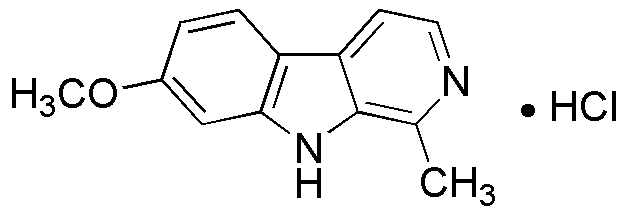Harmine hydrochloride is widely utilized in research focused on
- Neuroscience: It is studied for its potential neuroprotective effects and its ability to influence serotonin receptors, which may help in understanding and treating mood disorders.
- Pharmacology: Researchers explore its role as a monoamine oxidase inhibitor (MAOI), which can enhance the effects of certain antidepressants, providing new avenues for treatment strategies.
- Traditional Medicine: Harmine hydrochloride is derived from plants used in traditional medicine, particularly in South America, where it is investigated for its psychoactive properties and therapeutic potential.
- Cancer Research: Studies indicate it may possess anti-cancer properties, making it a candidate for further exploration in oncology, particularly in targeting specific cancer cell lines.
- Drug Development: Its unique chemical structure allows for the development of novel compounds that may lead to new therapies for various health conditions, including addiction and neurological disorders.
General Information
Properties
Safety and Regulations
Applications
Harmine hydrochloride is widely utilized in research focused on
- Neuroscience: It is studied for its potential neuroprotective effects and its ability to influence serotonin receptors, which may help in understanding and treating mood disorders.
- Pharmacology: Researchers explore its role as a monoamine oxidase inhibitor (MAOI), which can enhance the effects of certain antidepressants, providing new avenues for treatment strategies.
- Traditional Medicine: Harmine hydrochloride is derived from plants used in traditional medicine, particularly in South America, where it is investigated for its psychoactive properties and therapeutic potential.
- Cancer Research: Studies indicate it may possess anti-cancer properties, making it a candidate for further exploration in oncology, particularly in targeting specific cancer cell lines.
- Drug Development: Its unique chemical structure allows for the development of novel compounds that may lead to new therapies for various health conditions, including addiction and neurological disorders.
Documents
Safety Data Sheets (SDS)
The SDS provides comprehensive safety information on handling, storage, and disposal of the product.
Product Specification (PS)
The PS provides a comprehensive breakdown of the product’s properties, including chemical composition, physical state, purity, and storage requirements. It also details acceptable quality ranges and the product's intended applications.
Certificates of Analysis (COA)
Search for Certificates of Analysis (COA) by entering the products Lot Number. Lot and Batch Numbers can be found on a product’s label following the words ‘Lot’ or ‘Batch’.
Número de catálogo
Número de lote/lote
Certificates Of Origin (COO)
This COO confirms the country where the product was manufactured, and also details the materials and components used in it and whether it is derived from natural, synthetic, or other specific sources. This certificate may be required for customs, trade, and regulatory compliance.
Número de catálogo
Número de lote/lote
Safety Data Sheets (SDS)
The SDS provides comprehensive safety information on handling, storage, and disposal of the product.
DownloadProduct Specification (PS)
The PS provides a comprehensive breakdown of the product’s properties, including chemical composition, physical state, purity, and storage requirements. It also details acceptable quality ranges and the product's intended applications.
DownloadCertificates of Analysis (COA)
Search for Certificates of Analysis (COA) by entering the products Lot Number. Lot and Batch Numbers can be found on a product’s label following the words ‘Lot’ or ‘Batch’.
Número de catálogo
Número de lote/lote
Certificates Of Origin (COO)
This COO confirms the country where the product was manufactured, and also details the materials and components used in it and whether it is derived from natural, synthetic, or other specific sources. This certificate may be required for customs, trade, and regulatory compliance.

